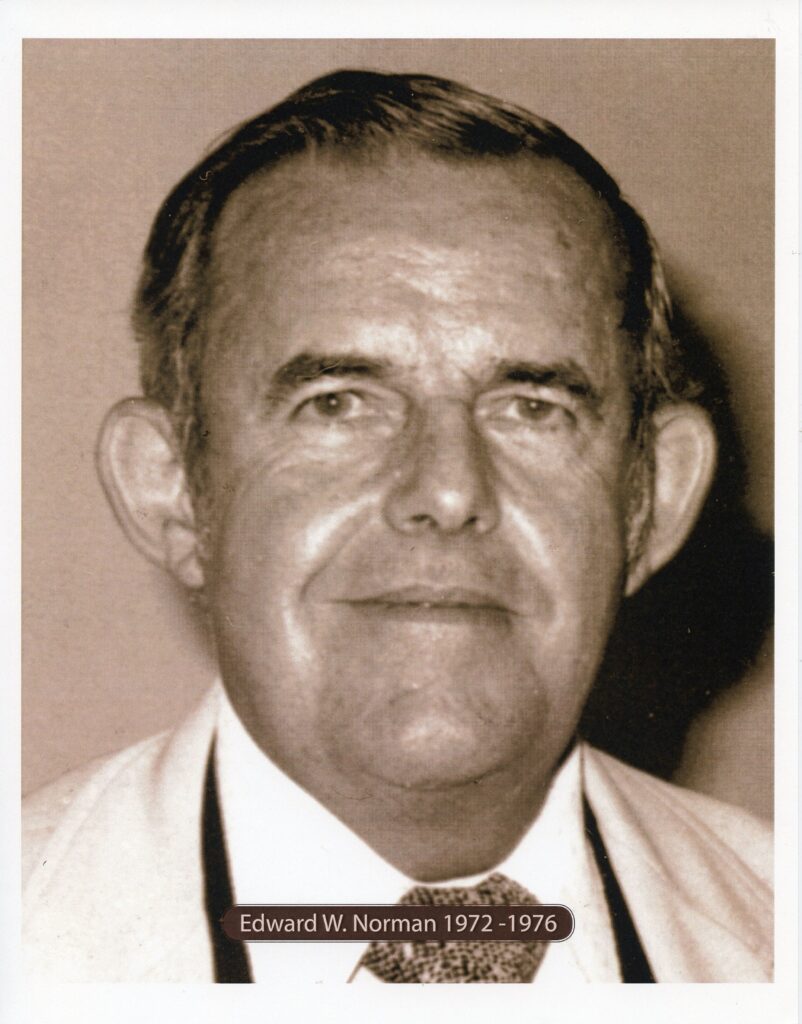By Gloria Colvin, Chair of the Bicentennial Publicity Committee
With Rev. Dr. George Foster’s retirement in 1972, he and his wife, Aultie, continued to worship at Trinity. A popular, dynamic speaker, he traveled widely in retirement and gave over 2,000 lectures at retreats, pastors’ schools, and churches, and she continued to teach Sunday School at Trinity.
Three pastors led Trinity through the 1970s and 80s and continued its traditions of service, community involvement, preaching excellence, and emphasis on education. The following are some of the highlights of these years.

1972-1976 Rev. Edward N. Norman served as Trinity’s Senior Pastor.
In 1973, Trinity opened a weekday nursery school with teachers Claire Nash and Mary Blackburn welcoming three- and four-year-olds three days a week.
Trinity celebrated its 150th anniversary in 1974 with guest speakers including former Gov. LeRoy Collins, FSU president and Trinity member Stanley Marshall, and Bishop Joel McDavid.
Publication of the monthly Tidings began in 1974.
Each Sunday at 9:00, WTNT broadcasted a Sunday School lesson taught by J. Kenneth Ballinger and music provided by Walter and Rae James.
In 1975, Walter and Rae James, longtime choir director and organist, retired after 28 years directing Trinity’s music program.
The church purchased two parsonages for its associate pastors, one on Lawson Road and one on Spence Ave.
Trinity sponsored a Vietnamese refugee family, Mr. and Mrs. Chinh Dang Hien and their children. Church members helped to find housing and jobs and to ease their transition to life in the U.S.
A house located on Trinity’s lot at the corner of Duval and Call Streets and previously home to Associate Pastors and Directors of Christian Education, transitioned to The Terrell House, a center where churches and community organizations provided services for families of prisoners at the Federal Correctional Institute and local jails.

1976-1981 Rev. Dr. Eugene Zimmerman served as Trinity’s Senior Pastor
By 1977, Trinity’s membership reached 2,666 members, making it one of the largest congregations in the Florida Conference.
The church continued its support of Dr. Vela Cleveland, a medical missionary in India.
H.E.O. (Help Each Other) was organized in 1980 by the United Methodist Women. Initially, it provided volunteers to visit, transport, and contact older members and to sponsor funeral receptions, but later grew to include other congregational support programs.
The Youth Center was renovated and named for Clyde W. Gregory.
In 1979, the church sold the parsonage located on N. Adams Street and built a new parsonage on Live Oak Plantation Road on a lot donated by the Middlebrooks family. The Zimmermans were the first pastoral family to live in the new parsonage.
1981–1988 Rev. Dr. Walter Kalaf served as Trinity’s Senior Pastor.
During his tenure, Dr. Kalaf was a strong advocate for education and took steps to invigorate the children and youth programs, as well as develop a program for adults. In 1984, Trinity Hall was renovated to modernize classrooms. Staffing was increased to include a Director of Christian Education and a director of an adult fellowship program. Trinity Troopers (now NetKids) started at this time.
At Dr. Kalaf’s invitation, an interfaith Thanksgiving service in Tallahassee was held at Trinity in 1982 and continued for many years.
Trinity joined with other churches to try to address the growing issue of homelessness, advocating for a permanent shelter and a Cold Night Shelter.
In 1987, Trinity helped start Killearn Lakes UMC, later changed to Deer Lake UMC.
The 11:00 worship service began broadcasting on WTAL, replacing the previous program on WTNT.
Trinity supported missionaries Gordon and Tereza Greathouse in Brazil.
Trinity sold the Spence Ave. parsonage, purchased a 15-passenger van, gave the Terrell House to the Tallahassee Housing Foundation, which moved it to the Bond Community, and entered into a lease agreement with Leon County for joint use of Trinity’s paved parking lots with the new Leon County Public Library.
Moor Hall was named in honor of Frank and Beth Moor, a new children’s library was named in memory of Carolyn Hart, and The John T. Sewell Memorial Prayer Garden was given by his wife, Nelle Sewell.
Some of Trinity’s history during these decades mirrored societal trends.
After the struggle for integration in the 1960s, Trinity welcomed its first Black members, FAMU Dean Dr. Rupert Grant Seals, his wife Georgetta, and their children in 1970. International students from Africa, studying at FSU, joined the church in subsequent years.
Women had always been involved in the church, but new leadership roles opened for them. Rev. Charlene Kammerer became the first woman ordained as elder in Florida in 1977 and later served as District Superintendent of the Tallahassee District. That same year, Kitty Ball was the first woman to serve as Chair of Trinity’s Administrative Board. In 1981, Carol Kowalski became the first woman to serve as an Associate Pastor at Trinity.
During this time, many churches saw a decrease in membership and participation, a trend that continues today. While Trinity’s membership declined somewhat, as did attendance at worship services and Sunday School, through evangelism and strong leadership and programming, the church continued to prosper.